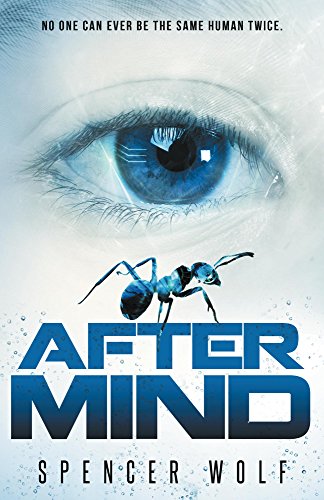After Mind
Reading through After Mind, I kept having the feeling that I had read this book already. Someone wakes up with no memory in a hospital room (Resident Evil and dozens of others). Turns out that he’s a young boy super-genius (Ender’s Game, the Flinx series), who is actually a prototype AI/memory repository (Brainstorm, Ghost in the Shell). As you read on, the tropes from dozens of science fiction stories pile up.
…and yet, it works.
This book manages to stitch together some of the more tired tropes (the father is a self-taught genius who never went to school or got a degree…which is why he can do things that those smarty-pants cannot) into a book where the characters struggle and are utterly, utterly human.
Our protagonist, Cessini, suffers from a rare condition — aquagenic urticaria; he literally breaks out into welts if he gets splashed with water. As such, he is painfully aware of sources of water around him, to the point where he uses his natural talent with mathematics to track the sources of potential danger in each room and tracks the rhythm of every falling drop. This fixation leads to a strange love-hate relationship with water, from the obsession with the fire sprinklers overhead, to the white noise machine in his room…which features the sound of the ocean. Cessini (pronounced “seas-ini”, like the sea) even dreams at night of an alter-ego who fearlessly swims the oceans bottom.
Cessini is a brilliant natural mathematician, able to do hexadecimal calculations at six. He constantly quantifies things, finds patterns, and, in turn, is a quite brilliant inventor, like his father. He spends his time building a robot in his father’s laboratory. He names the robot “Packet” after the name the other children taunt him with (as he can’t touch water, he has to clean up with a wet wipe).
Sometime in the story, Cessini dies. Because of the nature of the storytelling, you don’t find out from what until near the very end. And his story is taken up by a virtual representation of him, programmed with all his memories, created by his father. Packet (as the vitural-Cessini calls itself) has trouble telling the difference between memory and dream, has trouble connecting with the memories of Cessini. Confined (for the most part) to a virtual hospital room in a computer, the story does something very clever.
This is not a story about Cessini/Packet, but rather, a story of how a family deals with the loss and potential rebirth of a lost member… as told through his eyes. The father, Daniel, dedicates himself to refining the code running him, to bring his boy back. The mother, Robin, talks with and interacts with the boy, but not with a genuine connection. The sister, Meg, rejects the simulation completely. All mourn, all react differently to this stranger who is not, yet is so very like, their own lost boy.
Symbolism is placed liberally (sometimes overly so) around the book. There is no subtly about it… mirroring of characters (A young Meg mispronounces his name as “Seeme”), dreams, metaphors, memories. The colors blue and orange are mentioned countless times, as is water and the sea. Technology and Nature both battle each other, but also themselves. There is a subplot about an immoral doctor who invents a vaccine that happens to be slowly poisoning everyone, yet, at the same time, it is technology that saves Packet/Cessini (and what he uses eventually to reveal the truth). At times, nature and technology also blur together, such as Meg’s obsession video game, where she rescues and protects sea turtles.
It may be one of the oldest questions in Science Fiction, what is a human? What does it mean to be human? How much can we remove and still be called human? Meg has an artificial heart, Cessini has an artificial existence. Who is more real? Like Thesius’ ship, how much can you replace, even with identical parts, and still have the same ship?
After Mind does not attempt to answer these questions, but rather, leaves the reader to wonder and explore. We are both fascinated and repelled by the idea, much like Cessini and the oceans he dreams of.
| Author | |
|---|---|
| Star Count | 5/5 |
| Format | eBook |
| Page Count | 378 pages |
| Publisher | BentStrong Books |
| Publish Date | 25-Mar-2015 |
| ISBN | |
| Bookshop.org | Buy this Book |
| Issue | March 2015 |
| Category | Science Fiction & Fantasy |
| Share |







Reviews
There are no reviews yet.